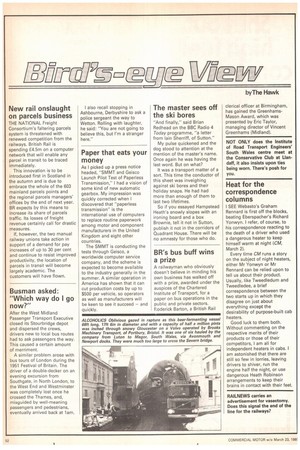New rail onslaught on parcels business
Page 54

If you've noticed an error in this article please click here to report it so we can fix it.
THE NATIONAL Freight Consortium's faltering parcels system is threatened with renewed competition from the railways. British Rail is spending £4.5m on a computer network that will enable any parcel in transit to be traced immediately.
This innovation is to be introduced first in Scotland in the autumn and is due to embrace the whole of the 603 mainland parcels points and the regional parcels managers' offices by the end of next year. BR expects by this means to increase its share of parcels traffic. Its losses of freight revenue certainly call for drastic measures.
If, however, the two manual railway unions take action in support of a demand for pay increases of up to 30 per cent and continue to resist improved productivity, the location of parcels in transit will become largely academic. The customers will have flown.
Busman asked: "Which way do I go now?"
After the West Midland Passenger Transport Executive closed its Stourbridge depot and dispersed the crews, drivers new to local bus routes had to ask passengers the way. This caused a certain amount of merriment.
A similar problem arose with bus tours of London during the 1951 Festival of Britain. The driver of a double-decker on an evening excursion from Southgate, in North London, to the West End and Westminster was completely lost once he crossed the Thames, and, misguided by well-meaning passengers and pedestrians, eventually arrived back at lam. I also recall stopping in Ashbourne, Derbyshire to ask a police sergeant the way to Wetton. Rolling with laughter, he said: You are not going to believe this, but I'm a stranger here."
Paper that eats your money
As I picked up a press notice headed, "SMMT and Geisco Launch Pilot Test of Paperless Transmission," I had a vision of some kind of new automatic gearbox. My impression was quickly corrected when I discovered that "paperless transmission" is the international use of computers to replace routine paperwork among motor and component manufacturers in the United Kingdom and eight other countries.
The SMMT is conducting the tests through Geisco, a worldwide computer service company, and the scheme is expected to become available to the industry generally in the summer. A similar operation in America has shown that it can cut production costs by up to $500 per vehicle, so operators as well as manufacturers will be keen to see it succeed — and quickly.
The master sees off the ski bores
"And finally," said Brian Redhead on the BBC Radio 4 Today programme, "a letter from lain Sherriff, of Sutton."
My pulse quickened and the dog stood to attention at the mention of the master's name. Once again he was having the last word. But on what?
It was a transport matter of a sort. This time the conductor of this sheet was inveighing against ski bores and their holiday snaps. He had had more than enough of them to last two lifetimes.
So if you essayed Hampstead Heath's snowly slopes with an ironing board and a box Brownie, tell it not in Sutton, publish it not in the corridors of Quadrant House. There will be no amnesty for those who do.
BR's bus buff wins a prize
A railwayman who obviously doesn't believe in minding his own business has walked off with a prize, awarded under the auspices of the Chartered Institute of Transport, for a paper on bus operations in the public and private sectors. Eoderick Barton, a British Rail clerical officer at Birmingham, has gained the GreenhamsMason Award, which was presented by Eric Taylor, managing director of Vincent Greenhams (Midland).
NOT ONLY does the Institute of Road Transport Engineers' South Wales centre meet at the Conservative Club at Llandaff, it also insists upon ties being worn. There's posh for you.
Heat for the correspondence columns
I SEE Webasto's Graham Rennard is first off the blocks, beating Eberspacher's Richard Yonwyn. I refer, of course, to his correspondence reacting to the death of a driver who used a dangerous heater to keep himself warm at night (CM, March 2).
Every time CM runs a story on the subject of night heaters, either Mr Yonwyn or Mr Rennard can be relied upon to tell us about their product. Usually, like Tweedlecium and Tweedledee, a brief correspondence between the two starts up in which they disagree on just about everything except the desirability of purpose-built cab heaters.
Good luck to them both. Without commenting on the respective merits of their products or those of their competitors, I am all for independent heaters in cabs. am astonished that there are still so few in lorries, leaving drivers to shiver, run the engine half the night, or use dangerous Heath Robinson arrangements to keep their brains in contact with their feet.
























































































